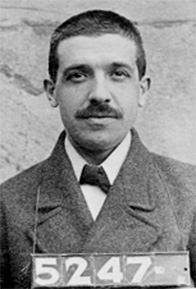 Image via Wikipedia
Image via WikipediaWe talk a great deal about Ponzi schemes (especially in these years of financial scandal), but not everyone knows where the term comes from. Unfortunately, the Ponzi scheme was one of the Commonwealth's less distinguished legacies to civilization. (though you have to admit: the idea was darned clever).
At any rate, Mass Moments tells us:
On this day in 1920, the Boston Post ran a story that ultimately exposed one of the biggest financial swindles in history. In a series of articles that won the paper its first Pulitzer Prize, the Post questioned the financial practices of Charles Ponzi. An Italian immigrant with dreams of greatness, Ponzi created a near frenzy in Boston by promising a 50 percent return within 45 days. In seven months, 30,000 people invested more than $10,000,000 in Ponzi's scheme. His plan to pay off early investors with funds raised from later ones inevitably collapsed. He was convicted of fraud and sent to prison. On his release, he was deported to Italy. He left behind his name as the definition of a certain kind of scam. (read the rest)
The article does point out that Ponzi in fact arguably did think he could somehow pay back his investors (the man seems to have been above all immensely ambitious and delusional). It could have added that, strictly speaking, the fraud bearing his name wasn't even a Massachusetts invention: As in the case of many other things, we just did it better or more flamboyantly and got the lion's share of the attention, for good or ill.

No comments:
Post a Comment